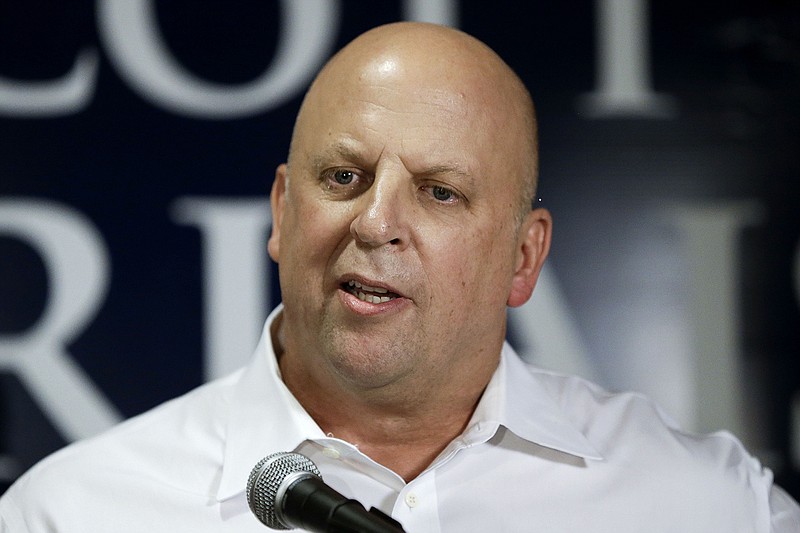Read more
DesJarlais' bill to allow military to carry firearms at recruiting centers passes Senate DesJarlais, Cohen co-introduce bipartisan 'Enhancing Safety at Military Installations Act''; other TN congressmen sign on DesJarlais, who supported ex-wife's abortions, votes for abortion ban
U.S. Rep. Scott DesJarlais, R-South Pittsburg, one of the 30 to 40 members of the U.S. House Freedom Caucus at the center of turmoil over the next speaker of the House, said Friday he didn't believe it is a stretch to think the next speaker could be a conservative Republican, not an establishment Republican.
"Conservatives are the overwhelming majority in the House and can get to 218 (the number of votes needed to nominate a GOP speaker)," he said. "I think we need to drive home that message."
House Republicans were thrown into chaos on Thursday when Majority Leader Kevin McCarthy of California abruptly withdrew from the race for speaker. Current House Speaker John Boehner of Ohio announced last month he would step down as speaker but said he would remain in office until the next speaker is chosen.
The far right Freedom Caucus has been seen by some in Washington as the monkey wrench thrown into the process. The group has been portrayed as too small to ensure passage of legislation itself but large enough to influence anything Republicans want to get done.
DesJarlais said the next speaker needs to be someone with an agenda of smaller government, rescinding Obamacare, cutting taxes and offering immigration reform.
"We need someone we can rally around," he said. "That's what we were elected to do, and that's who we are."
Such a speaker, according to DesJarlais, also would be one who "listens to the entire conference," gives everyone "a fair shot to introduce legislation" and does not punish the congressional district if the member does not go along with House leadership on every vote.
In January, he voted for U.S. Rep. Jim Jordan, R-Ohio, for speaker instead of Boehner. He said he'd also be interested in Rep. Trey Gowdy, R-South Carolina, stepping up, but Gowdy said he is isn't interested.
Rep. Paul Ryan, R-Wis., also is being pushed, and DesJarlais said "I'd certainly have to listen to his plans, but there are some conservative credentials he doesn't seem to have."
U.S. Rep. Chuck Fleischmann, R-Chattanooga, said Ryan, the chairman of the House Ways and Means Committee and former chairman of the House Budget Committee, could get the 218 votes but has repeatedly said he does not want the position.
"Paul Ryan is a friend," he said. "[He] is that rare person right now who could do that, could be a unifier. He has the respect of the majority of the conference."
Fleischmann said the speaker could be someone to the right of mainstream Republicans but would need to be "someone who can unify our conference."
"That means he would need to walk into the room with the [moderate] Tuesday Morning Group, the mainstream conservatives [of the Republican Study Committee, of which he is a member] or the Freedom Caucus and show every member the proper respect he or she is entitled to by being elected," he said.
Fleischmann said he also would like the new speaker to be "someone who can articulate a positive agenda" and someone with whom the majority of Republican voters can identify.
The third-term congressman said he is not supporting any candidate at present but is "keeping an open mind." Over time, candidates might include "new faces and new members out of the pack, someone who may not have sought leadership" positions in the past, he said.
DesJarlais said the American people voted overwhelmingly for a Republican House and Senate in 2014 and have seen the entire Republican House leadership (Boehner; Eric Cantor, who lost his primary re-election bid in 2014; and McCarthy) rejected. He has "a great sense of optimism" there is no better time for conservative leadership in the House.
"We're in the best place in years to satisfy the wishes and will of the people," he said.
The Freedom Caucus seems bent on truly shaking up Washington, D.C., changing the legislative process and doing the things they believe their constituents sent them there to do.
Its members understand voters' desires to hold the line on spending, fight against abortion funds and defund the likes of Planned Parenthood. They're unwilling to compromise or take "no" for an answer any more and may be willing to shut down the government over their beliefs. That same policy against business as usual has led to the rise of outsider GOP presidential candidates Donald Trump, Dr. Ben Carson and Carly Fiorina.
But getting things done in Washington, especially with an ideologue Democratic president, often requires compromise and not always getting 100 percent of what you want. So Republicans have not been united on important matters, and Boehner, after a fashion, and McCarthy were not willing to corral those unwilling to come inside the gate.
So for at least the next 15 months, the party needs someone who can unify its disparate factions, avoid incidents like a government shutdown that could come back to bite the GOP in a presidential election and articulate a positive message.
That's easier said than done, of course, but it's the best route to a Republican president in 2016 and larger majorities in Congress.
